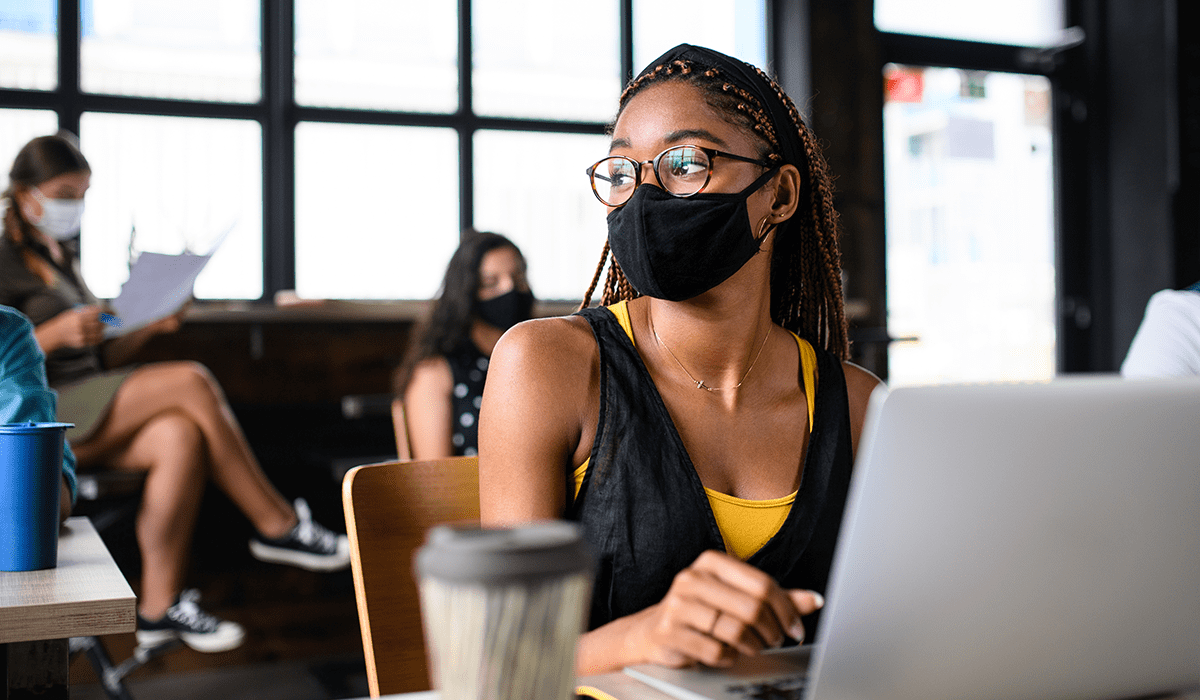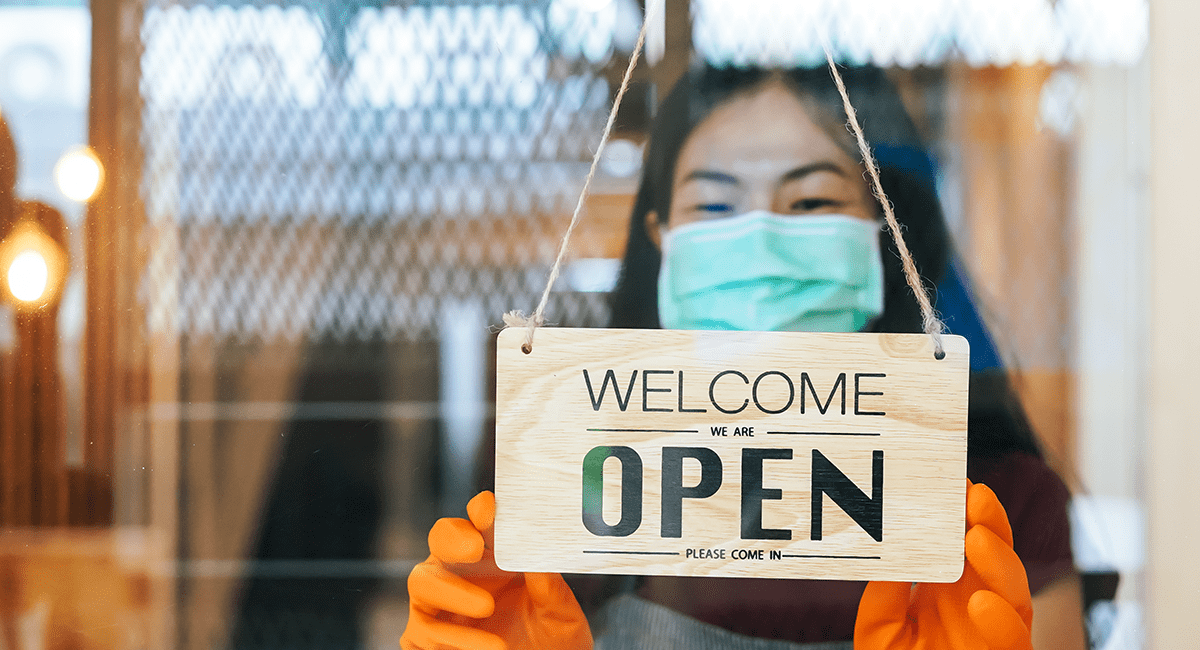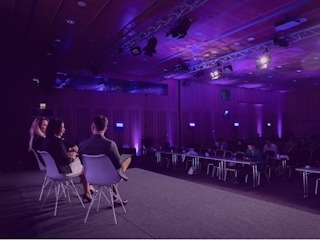Covid-19 will have a lasting impact on the human condition. Not least on the perception of our health and the people that work in healthcare. We must redefine our roles and responsibilities accordingly.
This third paper in a series of four is our invitation to stand back, to reflect, to re-energise and finally to re-engage. We hope you find the series thought-provoking and would love to hear your thoughts on this matter.
Opportunity spaces for innovation
Peter Drucker, the world's most prominent management thinker, once pointed out that incongruities—a dissonance between what is and what ought to be—are opportunity spaces to create something new and relevant. A recent study stated that 85% of executives believe that the current COVID-19 crisis will have a lasting impact on their customer's needs and wants over the next five years. Yet, only 21% feel they have the expertise, resources and commitment to pursue necessary innovation.
In a pandemic world, relevance is no longer determined exclusively by position, scale and capabilities in producing a product or delivering a service. Coexistence in the form of networks, platforms and partnerships will play an equally important role in how organisations become more relevant. The first is an orderly approach that rests on conformity and administration. It is the realm of BEST PRACTICES where the focus lies on improving efficiency and developing what already exists. Inherently, change is a transactional act that modifies the systems and processes in which stakeholders already interact. The latter is an explorative approach where co-creation and co-experimentation are necessary to shape ground-breaking NEXT PRACTICES. Essentially, change is a transformational repurposing of how stakeholders perceive their roles, responsibilities and relationships in society at large.
 COVID-19 serves as an amplifier of a transformation that was already on the way. The massive pull effect forged by the pandemic magnifies a shift from governments and big corporations to individuals and communities, from a narrower focus on economic efficiency to a principle discussion regarding solidarity. In August 2019, The Business Roundtable, a group of 180 CEOs from the world's largest corporations, called for a new standard of corporate responsibility. It reflects the beginning of a radical shift in commitment to all stakeholders—not just shareholders. Furthermore, according to the 2020 Edelman Trust Barometer, 56% of the more than 34000 respondents agree that capitalism, as it exists today, does more harm than good in the world. As the tectonic plates underneath the ever-changing health landscape are building up pressure, a new standard of coexistence is shaping how we must work together with others to change the system for the better.
COVID-19 serves as an amplifier of a transformation that was already on the way. The massive pull effect forged by the pandemic magnifies a shift from governments and big corporations to individuals and communities, from a narrower focus on economic efficiency to a principle discussion regarding solidarity. In August 2019, The Business Roundtable, a group of 180 CEOs from the world's largest corporations, called for a new standard of corporate responsibility. It reflects the beginning of a radical shift in commitment to all stakeholders—not just shareholders. Furthermore, according to the 2020 Edelman Trust Barometer, 56% of the more than 34000 respondents agree that capitalism, as it exists today, does more harm than good in the world. As the tectonic plates underneath the ever-changing health landscape are building up pressure, a new standard of coexistence is shaping how we must work together with others to change the system for the better.
The belief that everything was fine before disaster struck, and that all we need to do is return to things as they were, is simply unsustainable. Opportunity spaces for innovation lie in the intersection between what is and what ought to be. Commercial stakeholders will seek to create new markets based on new demands while they enter into broader coalitions to improve human lives at scale. Leaders that solely prioritise the pursuit of BEST PRACTICES in the wake of the pandemic will follow a path that inevitably leads to irrelevance.
Introducing human-2-business
The infectious disease COVID-19 knows no distinctions and no boundaries. We have all shared the same experience, witnessing a system put on hold everywhere in the world from one day to the next. We have all feared for the lives of our loved ones and questioned if the system can sustain us. The collective response to the pandemic has brought out both the best and the worst of humanity. It has displayed how we must learn, unlearn and relearn from even the most severe circumstances to restore and re-establish trust.
In that sense, the bottom-up response to the pandemic potentially holds the key to reform the healthcare system. According to Douglas Rushkoff, digital theorist and host of the podcast Team Human, we can develop the cultural immune response required to face such a challenge together, by utilising the autonomous and microlocal capacities of digital ecosystems. As Point of Care (POC) shifts away from analogue, we can use our emerging digital sensibilities to enable an out-of-system ability to create more meaningful experiences and to produce regenerative health outcomes.
Research presented in the second part of this series (link) suggests that the silver lining of the pandemic represents an opportunity space for innovation. If we can successfully repurpose the COVID-19 experience, we can better respond to the increased disease burden associated with non-communicable diseases (NCDs). There is an urgent need for commercial players within health to facilitate public-private-people coalitions (PPP coalitions) based on a shared plan of action. Local constructs of governments, markets and cultures will determine the unique shape and potential of such PPP coalitions. With the right leadership and accountability, we can strengthen health services to not only prevail the pandemic but to dramatically improve the treatment and prevention of NCDs in the future.
The redesign of healthcare systems enables us to reflect on what we are most attached to as humans. How we can drive positive change through our autonomous actions, and how we can proactively protect ourselves from the inequalities of the world. We can further enhance and enable the health experience via holistic use of services, data and technology. PPP coalitions should focus on exploring and promoting holistic offerings to serve the health needs of humanity. With the emergence of such transformational Human-2-Business (H2B) models, transactional B2B and B2C models will need complete reimagination.  It begs the question of how the health care industry can be part of a transformation that fosters new ways of operating in service of the common good. Central to the idea of H2B is a deep interest in connecting health, societal and economic progress on a larger scale. As such, it is an alternative to the narrow winner-takes-all mentality embedded in an increasingly obsolete industrial mindset. The H2B experience ultimately transforms our fear of not being normal and the emotional undercurrent of vulnerability into a healing power that can cure our chronic state of exhaustion—initially one by one and then collectively in larger numbers.
It begs the question of how the health care industry can be part of a transformation that fosters new ways of operating in service of the common good. Central to the idea of H2B is a deep interest in connecting health, societal and economic progress on a larger scale. As such, it is an alternative to the narrow winner-takes-all mentality embedded in an increasingly obsolete industrial mindset. The H2B experience ultimately transforms our fear of not being normal and the emotional undercurrent of vulnerability into a healing power that can cure our chronic state of exhaustion—initially one by one and then collectively in larger numbers.
Valtech has developed an H2B innovation framework that can serve as a conversation starter and bring PPP stakeholders together in workshops and innovation programs to explore mutual interests and experiment with new ways of operating. So far, the initiative has sparked interests among the biggest companies in the health industry. There is, however, still a long way to go.
Time to deliver
The legitimacy of leaders worldwide has been damaged in recent years by ongoing scandals across politics and business. Furthermore, leaders have failed to address systemic challenges such as climate change, growing inequalities and increasingly broken health care systems. According to historian and philosopher Yuval Noah Harari, irresponsible politicians have deliberately undermined public trust in science, in public authorities and international cooperation. As a result, the most critical outcome of the pandemic—due to lack of visionary leadership—could be greater disunity and mistrust among humans.
These phenomena go some way to explain the mood of civil unrest across the globe—from recent violent protests against coronavirus measures to the Black Lives Matter movement—where people feel they have no choice but to take to the streets to be heard. It is a reminder that the global challenges we face cannot be dealt with by leaders who merely talk about change while their actions are focused on upholding the status quo. What we need from our leaders is not complacency and conformity. We need courage and accountability to tackle the urgent problems that confront humanity and threaten our coexistence.  All living organisms confronted with change follow the same path. They see a need for change. They adjust their entire being to a new reality, and they subsequently act long-term to shape a better future for generations to come. If we genuinely care about implementing H2B models that can regenerate human health and build a better world, we must prioritise accordingly. We must SEE, BE and MAKE the change needed.
All living organisms confronted with change follow the same path. They see a need for change. They adjust their entire being to a new reality, and they subsequently act long-term to shape a better future for generations to come. If we genuinely care about implementing H2B models that can regenerate human health and build a better world, we must prioritise accordingly. We must SEE, BE and MAKE the change needed.
Vision to SEE the change
We can't make a change if we cannot see that one is needed. Inspiration and reorientation are at the beginning of any process of change. It relies on our ability to keep a fresh perspective. When we see things sooner, we can react faster. We must, therefore, proactively make sure that we expose ourselves to a diversity of thoughts and keep an open mind to having our perceptions of reality challenged.
Purpose to BE the change
Being—who we are—determines what we do. In leadership, character matters because we view the world through a prism of identity. To be the change, we must first cultivate a deep understanding of who we are and what guides us in life. We must embark on a profound intellectual, emotional and social journey that aims to define what we believe in, what we stand for and which legacy we want to leave for future generations.
Capability to MAKE the change
The renewal of societies can go forward only if someone cares and decides to act. To become a courageous pioneer of systemic change involves breaking through the rigidity and complacency of the status quo. We become advocates for change by letting our actions speak louder than our words.
The gap between what is and what ought to be constitutes the most significant opportunity space of our time. How we deal with that gap will ultimately decide if we can regenerate or if we will succumb to exhaustion.
It is time to deliver!







